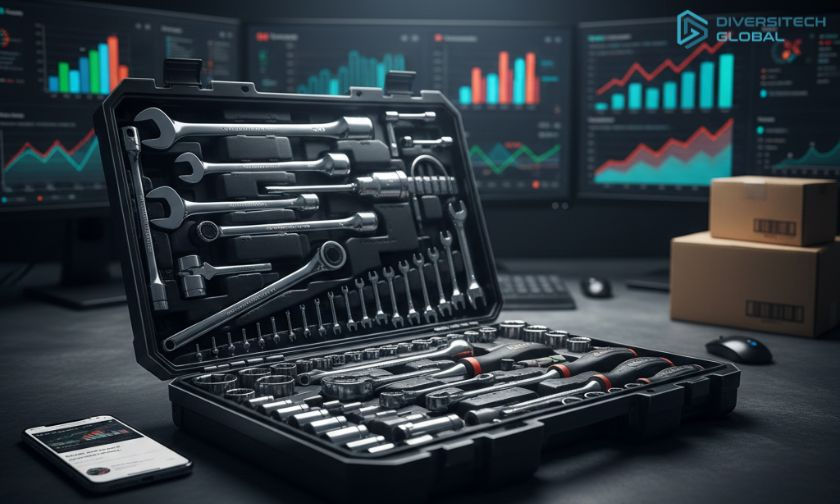The Impact of Trade Policies on China's Tool Box Export Industry
- Diversitech Global

- May 7, 2024
- 5 min read
Updated: May 8, 2024

China's ascendance as a global manufacturing powerhouse is well-documented, and the tool storage sector is no exception. As a significant toolbox manufacturer in China, the industry has experienced substantial growth, fueled by robust export activities. However, the dynamics of international trade are not static; they are influenced heavily by geopolitical tensions, trade agreements, and economic policies. These factors have profound implications for China's tool box export industry, affecting everything from production costs to market access.
This article delves into the complex interplay between trade policies and the export capabilities of toolbox manufacturers in China. By examining various policy changes and their repercussions, we aim ttro provide a nuanced understanding of how China's tool box manufacturers navigate the fluctuating landscape of international trade, thereby adapting their strategies to mitigate risks and seize opportunities.
Table of Contents:
The Role of Trade Agreements
Establishment of Free Trade Agreements
China has been proactive in establishing free trade agreements (FTAs) with various countries, which often reduce or eliminate tariffs on exported goods, including tool boxes. These agreements facilitate easier market access for Chinese manufacturers, allowing them to compete more effectively on price in foreign markets. For instance, the China-Australia Free Trade Agreement (ChAFTA) has significantly boosted exports by eliminating previously prohibitive tariffs.
Impact on Export Volumes
The correlation between the establishment of FTAs and an increase in export volumes is evident. By reducing trade barriers, these agreements have allowed Chinese tool box manufacturers to expand their reach into new markets that were previously less accessible due to high import duties. This expansion is not only beneficial for manufacturers but also for international consumers who gain access to a wider range of products at competitive prices.
Long-Term Economic Relationships
FTAs also foster long-term economic relationships by promoting trade continuity. For tool box manufacturers, these relationships are crucial as they provide a stable export income and help in planning long-term business strategies. These agreements also often include clauses that protect intellectual property rights, a significant concern for manufacturers moving into global markets.
Related Article: The Impact of Trade Policies on China's Tool Box Export Industry
Tariffs and Their Economic Impact
Increased Cost of Exports
Tariffs imposed by importing countries can significantly increase the cost of exported goods, making them less competitive in the global market. For example, the U.S.-China trade war saw increased tariffs on a wide range of Chinese goods, including tool boxes, which affected manufacturers' profit margins and forced them to reconsider their market strategies.
Response Strategies
In response to increased tariffs, some Chinese manufacturers have explored relocating production or assembly operations to countries with more favorable trade relations with target markets. This strategy, known as tariff engineering, helps circumvent high tariffs and keep products competitively priced in important markets like the United States.
Impact on Global Supply Chains
High tariffs disrupt global supply chains by increasing costs and causing delays. Manufacturers may need to source alternative materials or components from countries not subject to high tariffs, which can affect the quality, cost, and production time of tool boxes. This reconfiguration of supply chains can lead to significant operational challenges.
Intellectual Property Rights Protection
Importance in International Trade
Protecting intellectual property (IP) is crucial for maintaining competitive advantages. Chinese tool box manufacturers have often faced challenges related to IP theft or counterfeit products. Strong IP protection in trade agreements helps secure proprietary designs and technologies, which are integral to maintaining brand integrity and customer trust.
Challenges in Enforcement
While Chinese authorities have made strides in improving IP rights enforcement, challenges persist, especially in international contexts. Effective IP protection requires cooperation between nations, which can be complicated by differing legal frameworks and enforcement standards. Tool box manufacturers must navigate these complexities to protect their innovations.
Strategic Measures for Protection
Proactive measures, such as registering patents and trademarks in both domestic and foreign markets, are essential for Chinese manufacturers. Additionally, engaging in partnerships with local entities in export markets can help enforce IP rights more effectively and deter infringement activities.
Want to incorporate sustainability into your craft & art tool kits & double your sales? Get in touch
Currency Fluctuations and Pricing Strategies
Exchange Rate Impacts
Exchange rate volatility can significantly impact the pricing strategies of exporters. A weaker Chinese yuan makes Chinese exports cheaper and more attractive in foreign markets, potentially increasing sales. Conversely, a stronger yuan can reduce competitiveness abroad, forcing manufacturers to adjust their pricing strategies or find cost savings elsewhere.
Risk Management Techniques
Tool box manufacturers employ various risk management techniques to mitigate the adverse effects of currency fluctuations. These include entering into forward contracts or options that lock in exchange rates for a future date, thus ensuring more predictable costs and revenues.
Pricing Adjustments
Adaptive pricing strategies are crucial in responding to currency fluctuations. Manufacturers must balance maintaining competitive pricing to protect market share while ensuring they do not erode their profit margins. This balancing act is critical for sustaining long-term business viability in volatile economic conditions.
Related Article: Comparing Quality and Pricing from Top Chinese Tool Box Brands
Environmental Regulations and Compliance
Global Environmental Standards
Adhering to international environmental standards is increasingly important for Chinese manufacturers. Environmental compliance not only affects production practices but also market access, as many countries impose strict regulations on imported goods based on environmental impact.
Adapting to Green Manufacturing
To comply with these standards, Chinese toolbox manufacturers are investing in greener technologies and processes. This includes using eco-friendly materials and reducing emissions from manufacturing plants. While these changes often require significant upfront investments, they can lead to long-term savings and open up new markets focused on sustainable products.
Competitive Advantage
Manufacturers who lead in environmental compliance gain a competitive advantage, particularly in markets where consumers are highly environmentally conscious. Brands that are perceived as sustainable can attract a loyal customer base, enhancing their brand value and securing a strong market position.
Technological Advancements and Innovation
Role of Automation in Manufacturing
Automation in manufacturing processes is not just a trend but a necessity for maintaining competitiveness. Chinese toolbox manufacturers are increasingly deploying robots and automated systems in production lines to enhance efficiency, reduce costs, and improve product quality.
Integration of Advanced Technologies
Advanced technologies such as the Internet of Things (IoT), artificial intelligence (AI), and machine learning are being incorporated into the manufacturing processes. These technologies allow for smarter production planning and quality control, significantly reducing waste and increasing adaptability to market changes.
Innovation as a Market Differentiator
Innovation remains a critical market differentiator. Manufacturers that continually invest in new technologies and product designs can differentiate their offerings and capture premium market segments. Innovative features, such as tool tracking systems integrated within toolboxes, can provide additional value to consumers, further enhancing brand loyalty.
China's Toolbox Industry at the Crossroads
The intricate relationship between trade policies and China's toolbox export industry reveals a landscape filled with both challenges and opportunities. As Chinese manufacturers navigate these waters, their strategies in dealing with tariffs, IP rights, currency fluctuations, and environmental regulations will dictate their success on the global stage. Through resilience and adaptiveness, they continue to play a pivotal role in the global tool storage market, shaping industry trends and standards.
Related Article: How Chinese Toolbox Makers are Tapping into New Markets
Want to incorporate sustainability into your craft & art tool kits & double your sales? Get in touch




Comments